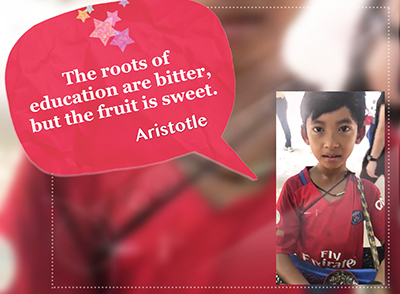



  




 



 
|
| 25. 11. 2018 ISSUE 13 | |||
|
|
Foreword |
|||
|
Dear readers, About a fortnight ago, a Cambodian boy was filmed hawking souvenirs in 11 languages and dialects other than his mother tongue (i.e. Mandarin, Japanese, Thai, Korean, French, German, Spanish, Malay, Filipino, Cantonese and Hainanese) outside a temple in Angkor Wat. While his talent seems too good to be true, public attention has again been drawn to the long-lasting problem of unschooled children and dropout students in some countries. What people usually describe "education" is an investment for the future. Admittedly, the Cambodian boy's road to better jobs and improved lifestyles may be paved by education, but the definition of "education" varies with its functionalities. In my opinion, "education" being an investment for the future is a misnomer. It should be a right to knowledge acquisition and value formation. The offer of all-round experiential learning opportunities to students for their holistic growth is the rule of thumb of the I·CARE Centre for Whole-person Development. This is the informal part of "education", and I am happy to be given the chance to bear a share of an educator in this campus. I am just worried, sometimes, that students can hardly spare time for the activities and services aside from their academic studies because of heavy course load as well as solicitation for bread and shelter. This city has become more fast-paced, polarised and wobbly, and CUHK is more or less a microcosm of the society. I am thus empathic with the students who may have adopted a wait-and-see, skeptical or even denial attitude towards the involvement in co-curricular activities and services which will lead to a widened perspective. Everyone has the right to reach out to the landscape with multiple features and different colours. This is outside-classroom "education". To discharge my duty as a member in the educators' row, I will work hard on facilitating the higher level of intrinsic motivation of our students. I hope I could successfully mobilise them to be more proactive and strategic in choosing how to allocate their time and resources to pursue whole-person education. Women always say, "no matter how full I am, somehow I can find room for desserts." Although in reality we do not have two stomachs for main meals and confectioneries respectively, we manage to find an excuse (like "I still have room") for consuming food that makes us comfortable. If you acknowledge the importance of holistic growth, imagine you have got an extra stomach to accommodate co-curricular activities and services. Believe in your imagination and take action! You will find it compatible with your academic studies and the necessities of life. Sincerely yours, Irene Ng |
|
||
|
|
|||
|
Past Issue
| |
|
|
|
|
|
